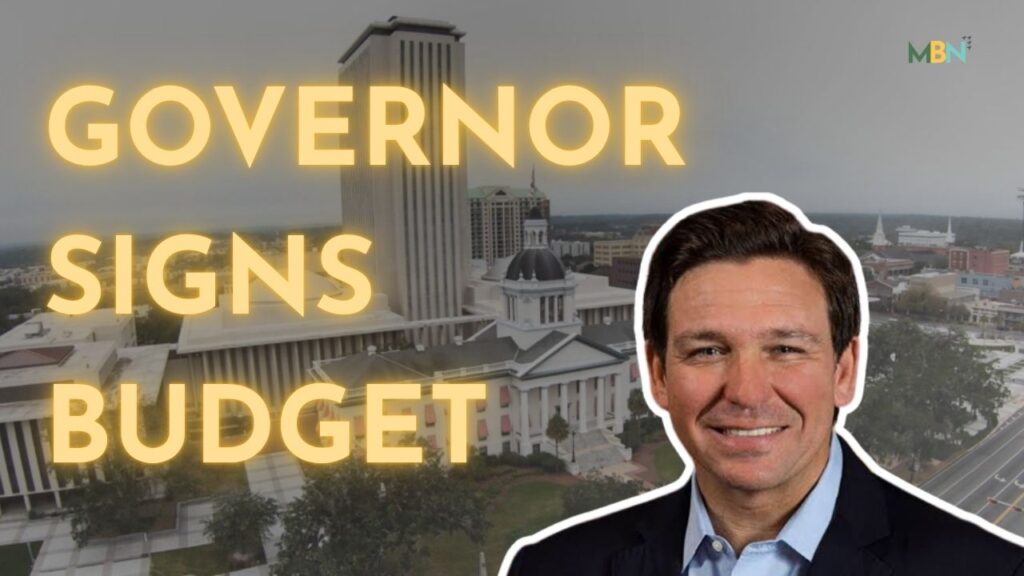
🧾 Over $80 million in local projects at risk: Budget vetoes may wipe out funding for key infrastructure, education, and health programs in Okaloosa and Walton counties.
💼 $2 billion tax cut package approved: Includes permanent exemptions and the end of Florida’s unique business rent tax.
🏛️ Session ended with tension: Political fights over spending priorities and nonprofits tied to the governor’s family shaped the outcome.
TALLAHASSEE — Gov. Ron DeSantis signed Florida’s $115.1 billion state budget for the 2025-26 fiscal year on Monday, slashing nearly $600 million in spending through line-item vetoes while approving a sweeping $2 billion tax cut package that primarily benefits businesses.
The budget, passed by lawmakers after a legislative session extended six weeks past its scheduled end date of May 2, reflects prolonged disputes between DeSantis and the Legislature over tax relief priorities and spending allocations.
RELATED: DeSantis Signs SB 1622. What Does It Mean for Customary Use of Local Beaches?
The governor signed the budget during a ceremony in The Villages, a Republican stronghold in Central Florida, on the eve of the state’s new fiscal year.
“Some of it wasn’t bad,” DeSantis said of the vetoed items, “but I thought it was important to get the budget spending in line with my recommendations.”
An itemized list of vetoes was not available as of Monday, but DeSantis said the cuts bring the state’s reserves to more than $12.4 billion.
In Okaloosa and Walton Counties, $80.3 million is currently at risk for various projects or grants for our area. The list of projects on the chopping block include:
The approved budget is $3.5 billion less than the current year’s spending and reflects months of tension between DeSantis, House Speaker Daniel Perez, R-Miami, and Senate President Ben Albritton, R-Wauchula.
Disagreements over whether to prioritize property tax rebates, a sales tax rate cut, or more modest tax relief contributed to the extended session and a combative tone in Tallahassee.
In the end, lawmakers agreed on a $2 billion tax package centered around eliminating Florida’s “business rent tax,” a 2% levy on commercial leases.
The move, long sought by business lobbyists, will save companies an estimated $1.53 billion annually but reduce state revenues by $904.8 million and local revenues by $623 million.
“Florida is the only state in the country that taxes business rent,” DeSantis said. “It’s bad policy and we eliminated it in this (bill), which I think is good, don’t get me wrong, but that probably affects a relatively small number of people.”
Other provisions in the tax bill (HB 7031) include a permanent back-to-school sales tax holiday each August, covering clothing items under $100 and school supplies under $50, and a $1,500 exemption for computers.
Disaster preparedness items such as batteries, smoke detectors, portable generators and gas cans will also be permanently exempt from sales taxes beginning Aug. 1.
Sales tax holidays and exemptions for sunscreen, insect repellent, state park admissions, NASCAR tickets and gold and silver bullion purchases were also included.
From Sept. 8 through Dec. 31, a temporary “Freedom Outdoors” sales tax holiday will cover guns, ammunition, tents, fishing rods, and camping gear.
The tax cuts are expected to save consumers and businesses a combined $2 billion, with about $1.3 billion coming from the state and $700 million from local governments.
Absent from the final package was DeSantis’ proposed property tax rebate and Perez’s plan to reduce the state sales tax rate from 6% to 5.25%.
Senate leaders objected to the sales tax cut, citing a projected $5 billion cost and concerns about long-term fiscal sustainability.
“The session was unnecessarily bumpy,” DeSantis said Monday, acknowledging political tensions that may have influenced his veto decisions.
Relations between the governor and House leadership soured further amid a House-led investigation into the Hope Florida Foundation, a nonprofit associated with First Lady Casey DeSantis.
The Florida Constitution requires lawmakers to pass a budget each year. This year’s approval came June 16—105 days into what was initially a 60-day session.
Register or login with Mid Bay News and never get another pop up on our site!